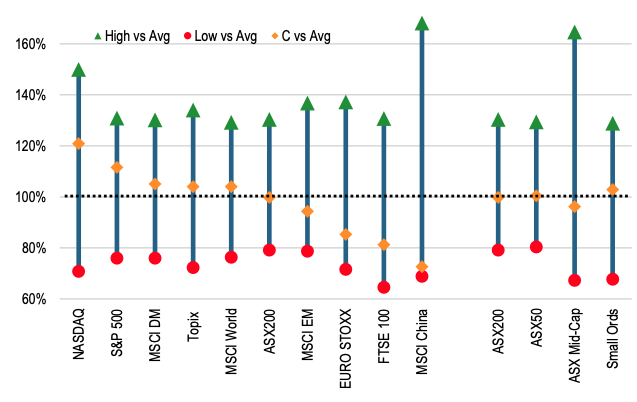In a shifting equity landscape, 3 ASX sectors and 4 stocks offer value
US equities remain the world’s most expensive, perhaps most starkly illustrated last week when the Dow Jones Industrial Average closed at a new record of 40,000 points.
Though the Dow has pulled back slightly since Monday 20 May, the latest research from JP Morgan’s Australian equity team finds US stocks are the world’s most expensive by a large margin. The NASDAQ’s forward P/E traded some 20% above the 10-year range, while the S&P 500 sat around 12% above the range in the report prepared in January.
P/E ranges: Current vs 10-year range

Source: J.P. Morgan estimates, Bloomberg Finance L.P.
But just a few years ago, the same study found Australia was the world’s most expensive market. The S&P/ASX ASX 200 Index, excluding financials and materials, was trading at a 37.9% premium to the global developed markets index in January 2020.
In the following, I ask Anthony Golowenko, who heads up MLC Asset Management’s Australian multi-asset Capital Markets business, for his views on equity valuations currently. He also explains where in the local market he sees the best value, with reference to several companies from his team’s portfolio.

How important is valuation?
We believe it’s extremely difficult to present an argument where starting valuation doesn’t have a meaningful influence on the likely profile of future returns.
Valuation is a key consideration within our investment framework and decision-making process and an area of regular, sometimes ‘spirited’ discussion.
What’s your broad view on equities within your portfolio mix?
Equities are one of the key drivers of meaningful long-term wealth creation. They continue to have a prominent place within our diversified multi-asset class portfolios.
Bringing in the prior question’s consideration of valuation, within our MLC Managed Accounts program we have reshaped parts of our Global Equities program to provide what we see as increased diversity and resilience in what may prove to be a pivotal year across all investment markets.
In short, we allocated some of the global developed market equity exposure to emerging markets equity, based on solid medium-term earnings outlook, superior valuation and increased breadth of return drivers.
Similarly, we allocated a further portion of this global developed market equity exposure to Alternative Real Return, to provide robust returns, superior diversification attributes and increased flexibility to deliver improved capital preservation should something other than a soft economic landing eventuate.
There was an opportunity cost over the short term, and in particular during the March 2024 quarter. But realistically, we’re making these asset and sub-asset class allocation calls over a medium-term (more like 12-18 month) time horizon, at a total portfolio level.
Which parts of the Australian market offer the most compelling value proposition currently?
Coming at this from an asset and sub-asset class perspective, with some direct responsibilities around a total return Australian Equity portfolio, I’ll concentrate on those areas where Australia stands out.
Fundamentally, the depth and breadth of the US equity market present a structural advantage for active managers seeking out compelling valuation opportunities. That has to be the default starting position.
Materials – A key consideration shaping our thoughts on Materials and specifically major ASX-listed miners is the structural advantage of low/lowest cost of production. From this starting position of high-quality assets and supporting infrastructure, generally speaking, disciplined management teams, this production cost structural advantage has translated into strong cash flow generation, and buoyant (franked) dividends for investors.
With this context, it is production volumes, over and above outright commodity prices, that support continuing robust cash flows, and dividends. We see Australia having a structural advantage, and generally speaking, representing a more compelling value proposition.
At this time, West Australian iron ore seemingly has the upper hand in shareholder total return/wealth creation.
Financials – This is an area of considerable debate, discussion, light and well, heat. Framing the Aussie big banks as essentially ‘lending machines’. They are very well-run businesses, profitable, and disciplined and represent the bedrock of traditional Australian equity allocations.
Particularly at this time, one thing they are not is high growth, in fact, quite the opposite. Recognising this more income-orientation, not dissimilar to the major miners, paying franked dividends can have a “foundation of regular income” role within portfolios. Their entrenched position and quality ‘level the scales’ so to speak, making them a compelling (equity income) value proposition.
It also has to be mentioned that the quality of the global franchise that is Macquarie Group (ASX: MQG), is definitely world-class and is still evolving into a home-grown success story.
Energy – Beyond these two sectors, Australia’s structural advantage in liquified national gas (LNG), and mega projects in WA, NT and QLD also rate a mention.
Among your three preferred sectors, what is one high conviction stock from each?
From an Australian perspective, the following have high quality, well managed, solid, resilient margins and profitable growth companies.
Industrials – Seven Group Holdings (ASX: SVW)
The triple threat that is their WesTrac, Coates, and soon-to-be 100% of Boral (ASX: BLD) businesses, coupled with essentially controlling interests in Beach Energy (ASX: BPT) and Seven West Media (ASX: SWM), represents a domestic powerhouse that is very well positioned to continue to execute their growth strategy with what will seemingly continue to be structural tailwinds at their backs.
Industrials – Qube Holdings (ASX: QUB)
The foundation of an incredibly difficult-to-replicate, incredibly difficult-to-disclodge essential port, rail and coming-online intermodal terminal network of assets is a fantastic foundation to leverage the efficient movement of goods amongst a growing population and economy. Over time we see the potential for further productivity and efficiency gains, and increased throughput at these key infrastructure assets.
Consumer Discretionary – Nick Scali (ASX: NCK)
In the category of good, well great, things coming in small packages, it’s hard to go past Nick Scali as a strong example of a quality business delivering for shareholders. Profitable growth, organic and more recently inorganic expansion, improving margins, driving business efficiency and all the while delivering a foundation of regular franked dividends.
Are there any equity sectors across each of the US and Australia that you’re avoiding (and if so, why)?
Broadly speaking, we’re cautious in the Financials sector, specifically Real Estate and at the sub-sector level Office. That being the case, beyond the near-term there will likely be selective opportunities in this sector and sub-sector, some of which are being evaluated within our Alternatives, Specialty Financing allocation.
Domestically, we’ve got a lower representation in the big four banks, seeing more attractive opportunities in the likes of Macquarie Group, and Insurers, across general and health insurance.
Using similar reasoning to the reshaping of parts of the MLC Managed Accounts’ Global Equities program, but applied at a more micro level, within A-REITs the dominance of Goodman Group (ASX: GMG) on what we see as an expanded valuation has seen the selective building out of exposure in the Industrial/Logistics, Self-Storage and Destination Retail.
4 topics
8 stocks mentioned
1 contributor mentioned

